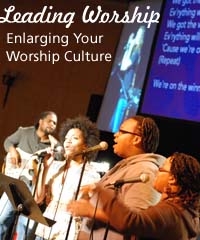You may wonder if you will ever change the world, but if you’re involved in a Christian group on campus, you have more influence that you think.
Enlarging your worship culture

I’ve been on many urban and overseas summer projects, and have worshiped with people of different cultures, like the Bengali people in Calcutta, India. As I listened to them joyfully sing their worship songs in response to God’s presence and power in their lives, I realized that worship cannot be separated from culture. Of course, I felt a little like an outsider, but multicultural worship is worth the effort. Here are some ways to expand your experience.
InterVarsity’s triennial Urbana missions conferences have profoundly shaped my understanding of worship. My first Urbana experience gave me my first glimpse of what worship in heaven will be like. Revelation 7:9 describes it as “… a great multitude that no one could count, from every nation, tribe, people and language, standing before the throne and in front of the Lamb” (NIV). Urbana provides a taste of worship with many cultures, and past conventions have radically changed my perspective of God’s heart for the world. When I was with the Bengali people, I was not able to fully enter into worship with them because I didn’t understand the language and customs of their culture. But eventually, in God’s heavenly worship service, no one will be left out when all cultures praise him authentically as one.
Teresa Chavez Sauceda describes the connection between culture and worship, “Culture is the vehicle through which we express our faith in God, the tool we use to give praise to God, the words and images by which we pray to God.” Our culture is also the vehicle through which we understand God’s voice and are molded into his likeness. We recognize God’s power when he comes to us in a way we understand. We can respond to his voice as he speaks in a language we know. God is certainly not defined by our culture, but our incarnational Lord chooses to speak through it.
All cultures have attributes that give glory to their Creator, and all cultures demonstrate their rebellion against the Creator. It is our own ethnocentrism at work when we claim that our own cultural preferences are more appropriate for worship than those of others. When many people of different cultures come together in worship, one worship culture will not enable all people to praise their Maker authentically.
There is a pressing need for a new way for diverse people to come together in worship. North America is becoming increasingly multicultural. Universities and colleges are unique shelters for hundreds of people groups. If we are to be people who are sent out to love God’s children throughout the world, we must start by recognizing and honoring the diversity of cultures on our campuses. Why would we expect to bring the gospel with love to other cultures overseas when we haven’t practiced it in our daily lives with the people in our dorms and classes? We must conscientiously value cultural diversity as we worship together in our local campus chapters.
Expanding multicultural worship
The multicultural worship at events such as the Urbana missions conference or your own regional InterVarsity events may provide a model for you. Here are additional ideas to expand the worship experience in your fellowship:
- Identify what defines your personal worship culture and your chapter’s worship culture. The best way to determine your worship values and cultural expressions is to experience worship with people who are different from you. Go to churches of different ethnicities and denominations and watch how they communicate with God and celebrate his goodness. Songs are only one aspect of how believers communicate with God, just as words are only a small part of communication with other people. Step out of what is familiar and experience something new, and you will see a contrast with your own worship culture.
- Identify what ethnicities are represented on your campus and learn about their worship cultures. Universities are often the most diverse areas of many cities, so worship on those campuses should not be mono-cultural. Don’t forget to explore what Christian denominations are also represented on your campus. Don’t wait to implement those new cultural expressions until you have students from those cultures in your fellowship. Multicultural worship can be an act of hospitality, but it also brings glory to God by recognizing the beauty of his creation. Broadening your “worship vocabulary” enables everyone to deepen their understanding of our global God.
- Pursue an honest friendship with someone from a different worship culture. When you give your heart to another in friendship, your desire will increase for everyone to worship authentically and be transformed by God. If you are a worship leader, your friend will also be able to give feedback as you try to lead in their primary worship culture.
May God enable each person in your chapter, no matter what worship culture they are from, to live out the words of Psalm 63: “I have seen you in the sanctuary, and beheld your power and your glory. Because your love is better than life, my lips will glorify you. I will praise you as long as I live, and in your name I will lift up my hands” (NIV).
—Krista-Dawn Kimsey






